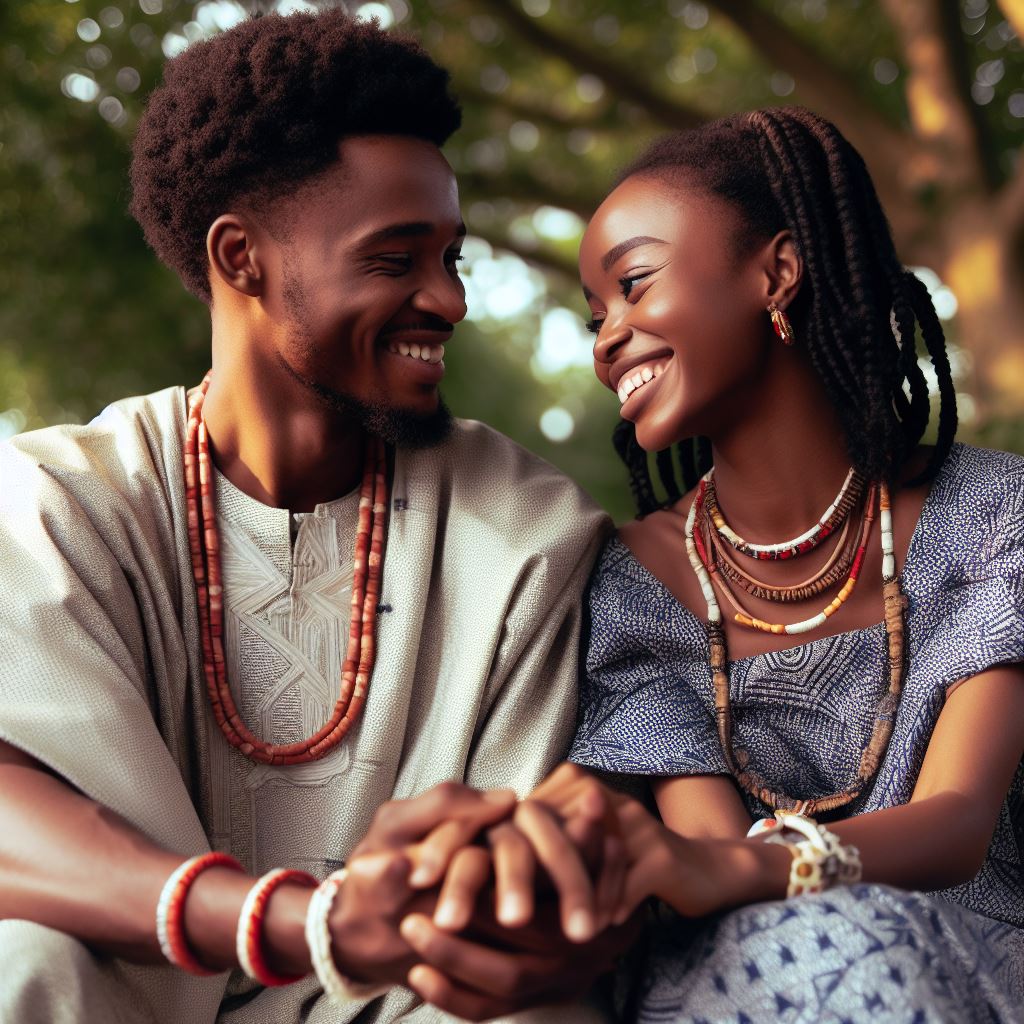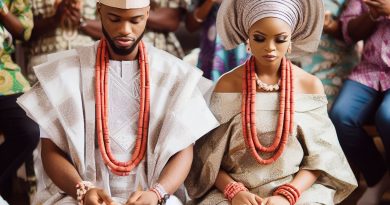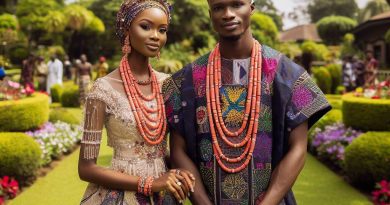Changing Times: Millennial Perspectives on Marriage in Nigeria
Last Updated on January 28, 2024
Introduction
Marriage in Nigeria: Tradition meets Modernity
Nigeria, a nation brimming with diverse cultures, has long held marriage as a sacred institution.
It’s a ceremony adorned with colorful rituals, rich traditions, and deep-rooted customs.
Yet, the essence of marriage in Nigeria has evolved over time, mirroring the changing fabric of society.
The institution once purely arranged is now a blend of choice and family values, showcasing how times have shifted.
The Significance of Millennial Views
The perspectives of Nigerian millennials on marriage are an invaluable insight into this transformation.
Millennials, born between 1980 and 2000, belong to a generation that bridges the gap between old traditions and new ideas.
They have grown up amidst technological advancements, globalization, and changing gender dynamics, which influence how they perceive and engage with the age-old institution of marriage.
As the torchbearers of the future, their views can offer guidance on how marriage may further evolve in this ever-changing landscape.
In this blog post, we will delve into the intricate interplay of tradition and modernity in Nigerian marriages, with a keen focus on the views of millennials.
Their thoughts, aspirations, and expectations regarding marriage are vital in shaping the path forward.
Join us as we explore the fascinating tapestry of marriage in Nigeria through the lens of the millennial generation.
Traditional views on marriage in Nigeria
Arranged Marriages
- The Process: In Nigeria, arranged marriages remain a deeply rooted tradition. The process begins with parents seeking a suitable match for their child.
- Family and Elders: Elders play a central role in these unions. They act as mediators, ensuring compatibility, and often take part in negotiations.
Importance of Cultural and Tribal Affiliation
- Cultural Significance: Nigeria is a diverse nation, rich in cultures and tribes. Marriages often emphasize the preservation of cultural identity.
- Tribal Affiliation: Many unions are strategically formed within the same tribe, bolstering unity and cultural cohesion.
Gender Roles and Expectations
- Traditional Gender Roles: In arranged marriages, gender roles are typically well-defined. Men are expected to provide for the family, while women manage the household.
- Expectations: Wives are expected to be obedient and nurturing, while husbands are seen as protectors and providers.
As the winds of change sweep across Nigeria, it’s crucial to consider these traditional viewpoints.
While arranged marriages may seem archaic to some, they’re deeply ingrained in the Nigerian culture, fostering familial bonds and cultural preservation.
The significance of cultural and tribal affiliation in these unions can’t be overstated, as it plays a pivotal role in maintaining the country’s diverse identity.
Furthermore, the traditional gender roles and expectations, while evolving with time, still influence marital dynamics.
As we explore the evolving perspectives on marriage among Nigerian millennials, understanding the roots of these traditions helps us appreciate the complex interplay between tradition and modernity in their quest for love and partnership in changing times.
Read: Sustaining Love: Key Prayers for Long-lasting Nigerian Marriages
Factors influencing changing perspectives
Globalization and exposure to Western ideals
Increased access to information and media has introduced Nigerian millennials to different cultural practices and relationship dynamics.
The influence of Western ideas, such as individualism and gender equality, have shaped their views on marriage.
As a result, traditional Nigerian values and expectations in marriage are being reevaluated and challenged.
Education and career aspirations
With improved educational opportunities, millennials are focusing on personal growth and professional success.
Pursuing higher education and establishing a career have become important priorities for many Nigerian millennials.
This shift in focus has led to delays in marriage as millennials prioritize self-development and achieving financial stability.
Influence of social media and online dating
The rise of social media and online dating platforms has transformed the way Nigerian millennials approach relationships.
These platforms provide a wider pool of potential partners and facilitate connections beyond traditional social circles.
Online interactions and exposure to different relationship experiences have influenced millennials to have higher expectations in marriage.
Economic challenges and financial considerations
Nigeria’s economic landscape presents significant challenges for millennials considering marriage.
Unemployment rates, inflation, and financial instability make it difficult for young adults to establish a stable foundation for a marriage.
Financial considerations, such as the costly Nigerian marriage ceremonies, are also deterring millennials from getting married at an early age.
Basically, several factors have influenced the changing perspectives on marriage among Nigerian millennials.
The exposure to Western ideals through globalization has challenged traditional values.
Education and career aspirations have caused delays in marriage as millennials focus on personal growth.
Social media and online dating have influenced expectations in relationships.
Economic challenges and financial considerations also play a significant role in millennials’ decision to delay or reconsider marriage.
It is important to understand these factors to gain insight into the evolving dynamics of marriage in Nigeria.
Read: Marriage Challenges? Here’s a Prayer Guide for Nigerian Couples
Millennial perspectives on marriage
Delayed marriages and the pursuit of personal goals
- Nigerian millennials prefer to delay marriage in order to focus on their personal goals.
- They believe in establishing a stable career and financial independence before settling down.
- This shift in priorities allows them to pursue their passions and dreams before committing to marriage.
Shift towards love and emotional compatibility
- Millennials in Nigeria prioritize love and emotional compatibility in choosing a life partner.
- They seek a deeper connection and want to marry someone they genuinely love and share a strong bond with.
- Physical attraction is no longer the sole basis for marriage; emotional compatibility holds greater importance.
Importance of individuality and independence
- Nigerian millennials value individuality and independence in a marriage.
- They want to maintain their personal identity and pursue their own interests even after tying the knot.
- Striking a balance between personal freedom and commitment to the relationship is crucial for them.
Rise of intertribal and interreligious marriages
- Millennial Nigerians are breaking traditional barriers of tribe and religion in their choice of life partners.
- They believe that love and compatibility are more important than cultural or religious differences.
- Intertribal and interreligious marriages are seen as a way to promote unity and foster diversity in society.
Acceptance of non-traditional family structures
- Nigerian millennials are more accepting of non-traditional family structures.
- They believe that a family can be formed through various means, such as adoption or same-sex relationships.
- This progressive mindset reflects their openness towards diverse forms of love and relationships.
Generally, millennial perspectives on marriage in Nigeria are changing in significant ways.
They prioritize personal goals, emotional compatibility, individuality, and intertribal/interreligious relationships.
Additionally, they embrace non-traditional family structures, reflecting a more inclusive and diverse society.
As the millennial generation continues to shape the cultural landscape, these perspectives will continue to evolve and redefine the institution of marriage in Nigeria.
Read: Prayers for Every Season of Your Nigerian Marriage Journey

See Related Content: Lagos vs Abuja: Where to Register Your Marriage in Nigeria?
Challenges and criticisms of changing perspectives
Resistance from older generations
- The older generations in Nigeria often resist the changing perspectives on marriage.
- They view the new perspectives as a threat to traditional family values and norms.
- Older individuals may express disapproval and attempt to discourage the younger generation from adopting new attitudes.
- This resistance can create tension and conflicts between generations.
- It becomes a challenge for millennials to navigate their desires while also respecting the opinions of their elders.
Social stigmas and judgment
- Changing perspectives on marriage face social stigmas and judgment from society.
- Millennials who deviate from traditional marriage expectations may face criticism and ostracization.
- People often judge those who opt for non-traditional partnerships or choose to remain single.
- Such stigma can lead to feelings of shame, causing individuals to hide their true desires and decisions.
- This judgment creates a hostile environment for those seeking to break free from societal expectations.
Balancing traditional values and modern outlook
- Millennials in Nigeria are challenged with finding a balance between traditional values and modern outlooks on marriage.
- They want to uphold the cultural and familial expectations while pursuing personal fulfillment.
- This struggle often results in millennials feeling torn between fulfilling societal expectations and following their own desires.
- They must navigate between honoring their heritage and embracing a more individualistic approach.
- Striking this balance requires delicate navigation and may lead to internal conflict.
Impact on cultural heritage and identity
- The changing perspectives on marriage in Nigeria can impact cultural heritage and identity.
- Marriage has historically been a cornerstone of Nigerian culture, connecting individuals to their heritage and traditions.
- Deviation from traditional marriage practices may be seen as a betrayal of cultural identity.
- Young Nigerians are challenged with preserving their heritage while embracing more progressive views on marriage.
- This tension between tradition and modernity can result in a loss of cultural cohesion and identity confusion.
Essentially, the changing perspectives on marriage in Nigeria face various challenges and criticisms.
The resistance from older generations, social stigmas, and judgment create obstacles for the younger generation.
Additionally, finding a balance between traditional values and modern outlooks becomes a struggle for millennials.
The impact on cultural heritage and identity further complicates the issue. Despite these challenges, Nigerian millennials are determined to forge their own paths and navigate these changing times.
Read: Intimacy Beyond Words: Incorporating Prayer in Marital Life
Conclusion
Millennials in Nigeria are reshaping the institution of marriage.
They view it as a partnership rather than a traditional duty.
These young adults prioritize love, compatibility, and personal growth.
They’re delaying marriage to establish themselves professionally and financially.
Importance Open Dialogue and Understanding Between Generations
This shift sparks intergenerational discussions.
Elders, who married for different reasons, must understand these changing values.
Open communication bridges the generational gap.
It allows mutual respect and recognition of evolving expectations in marriage.
Cultural Adaptation and Acceptance of Evolving Viewpoints
Nigeria’s rich culture can coexist with modern perspectives on marriage.
Adaptation is key, respecting tradition while embracing change.
Accepting evolving viewpoints fosters harmonious family dynamics and societal progress.
As millennials redefine marriage, let’s celebrate this transformation.


